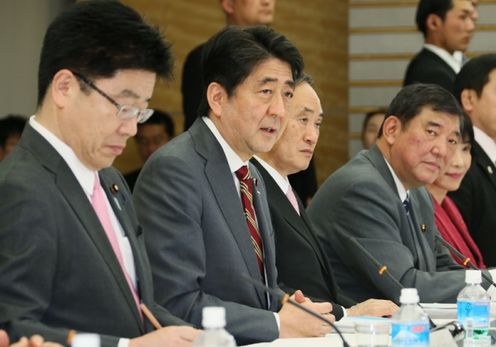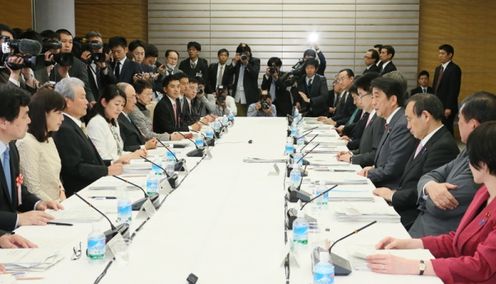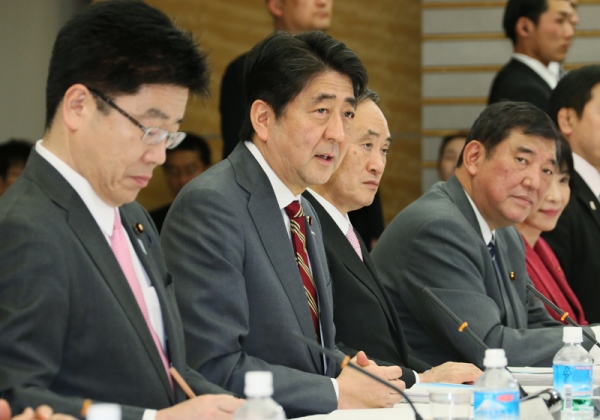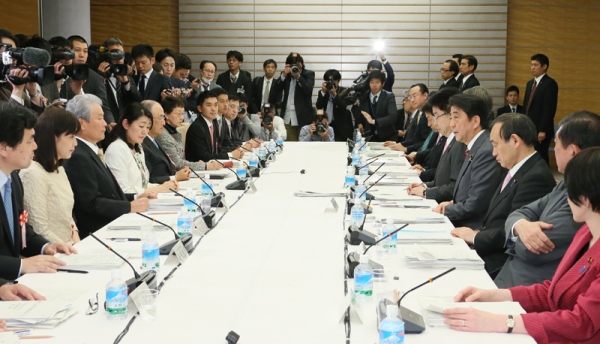Home > News > The Prime Minister in Action > March 2016 > National Council for Promoting the Dynamic Engagement of All Citizens
The Prime Minister in Action
National Council for Promoting the Dynamic Engagement of All Citizens
March 25, 2016

Photograph of the Prime Minister making a statement (1)

Photograph of the Prime Minister making a statement (2)
[Provisional Translation]
Prime Minister Shinzo Abe held the sixth meeting of the National Council for Promoting the Dynamic Engagement of All Citizens at the Prime Minister’s Office.
During the meeting, there was an exchange of opinions on correcting the practice of working long hours, promotion of employment among women, and issues related to educating children.
Based on the discussion, the Prime Minister said in his address,
“First is the correction of the practice of working long hours. This practice makes it difficult to balance work with family life, including raising children, and is a cause of the declining birthrate and one of the obstacles preventing the active participation of women. Ever since the period of rapid economic growth following World War II, there has been a value system which says that one should take pride in not getting very much sleep, and that being extremely busy is productive. Gradually, I think that the atmosphere in Japan has started to broadly change over these past three years to one in which people believe that value system is false, and does not truly result in productivity. That was the value system that was in place when I was a young company employee, where the atmosphere was such that if one tried to leave work at 8 p.m., people would say, “You’re going home already?” When we asked companies about Government initiatives to instigate a shift that would restrain the practice of working long hours and change the way people work, 90% of those surveyed responded that they expected the Government to do so, and change the atmosphere toward one in which people can go home at the end of the work day if they wish to. We have finally started to see a shift toward that kind of atmosphere, and I think it is important that we continue to support it even further.
First, we will swiftly strengthen the enforcement of legal regulations. We will strengthen guidance on Article 36 of the Labor Standards Act for employers who have agreements with their employees about overtime work and who have set long work hours that are undesirable from a health standpoint. In addition, relevant ministries and agencies will join forces to create a framework that can correct the practice of working long hours through the transaction conditions set for subcontractors and others. For these efforts to enhance the enforcement of regulations, I request the swift compilation of concrete measures and the immediate shift toward the execution of those measures through cooperation among the Minister of Health, Labour and Welfare, the Minister of Economy, Trade and Industry, and Minister Kato.
There has been a variety of discussion on the amendment of the Labor Standards Act. Related to that, in addition to the bill for the amendment of that Act that has been submitted to the current session of the Diet, we will once again consider the state of regulations on overtime work and work on days off contained in Article 36.
Secondly, there are the issues of the promotion of employment among women and issues related to educating children.
I want to request the creation of a concrete roadmap based on the opinions discussed today toward the formulation of the Plan to Realize the Dynamic Engagement of All Citizens. In addition, I want to request discussion within the business community on the opening of a path toward re-employment for regular employees who temporarily leave their positions to raise their children, or for other reasons.”


